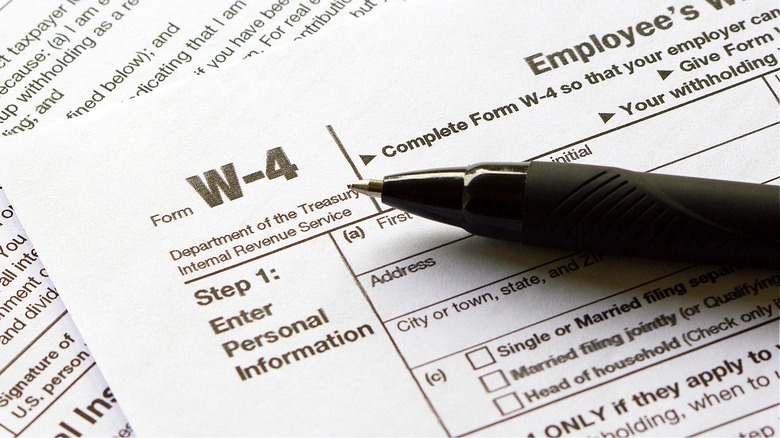5 Ways State Income Tax Might Catch You By Surprise In 2023
For residents of nine U.S. states, state income tax isn't something they need to think about when filing their federal income tax returns. Alaska, Florida, Nevada, South Dakota, Tennessee, Texas, Washington, and Wyoming — these states don't impose state income tax on earned income, while New Hampshire is currently phasing out its tax on dividends and interest income. As for taxpayers living in the other 41 states and the District of Columbia, state income tax is indeed something to think about every April. Residents of these states need to file both a federal and state income tax return. That being said, even though these residents know they pay taxes to the state as well, that doesn't mean their tax return can't still catch them by surprise.
When you finish preparing your state tax return and find you have a tax liablity, you might be surprised by the calculation. Did you miss a zero somewhere, or maybe add one? That may very well be the case, but it could be for various other reasons, too, including withholding too little during the year, being unable to claim as many deductions, and finding yourself in a different tax bracket.
1. Your tax withholding needs an adjustment
If you're surprised by your state income tax return, take a good look at your tax withholding. Note, while you get a tax refund when you overpay your taxes for the year, you owe if you underpay. This amount all depends, though, on your W-4 and how much you tell your employer to withhold from your taxes each paycheck.
After filling a W-4 out, you might never change it again, but even if you stay at the same job, you might want to check it every year, especially if your situation at work changes. For example, you get a promotion and consequently, a raise. If you withhold the right amount, you should end up owing nothing, while also getting nothing back in return. And if you're surprised by how much you owed this year, then that tells you your current withholding is a bit off.
For federal income tax, the IRS provides a tax withholding estimator. For state income tax, check with your franchise tax board for a similar tool. Here, for example, is California's calculator.
2. You owe taxes on self-employment income
If you receive a W-2 at the end of the year for your job, then your employer withholds tax for you. Again, that W-4 you fill out tells your employer exactly how much you'd like them to take out every paycheck to cover taxes. But if your job isn't a W-2, then you'll need to set aside taxes yourself and pay them on a quarterly basis (i.e., estimated tax payments), if you expect to earn over $1,000.
If you don't send in enough estimated tax payments throughout the year, you may be penalized for being late. As the IRS notes, this could even apply if you expect a tax refund. For state income tax, you're also expected to send in quarterly payments. To figure out how much you'll owe, again, use a calculator to get a figure to work from. You could also set aside 25% to 30% of your total earnings, which should cover your taxes. In addition, though, if you earn over $400, you'll also be imposed a self-employment (SE) tax, which is 15.3% of your net earnings. This covers Social Security tax (12.4%) and Medicare (2.9%).
3. You're in a different tax bracket this year
While getting a raise is always a good thing, it also could put you in a different tax bracket, which ranges from 10% to 37% at the federal level; your tax rate at the federal level is determined by your income and filing status. If you're single, for example, and earn between $44,726 and $95,375, your tax rate for 2023 will be 22%. If, however, you got a promotion and now make $97,000 a year, your tax rate jumps to 24%. That could lead to a surprise come tax time, especially if you didn't adjust your W-4 when you got your raise.
States, meanwhile, vary in how they impose income tax. While some states have a flat tax system, which applies the same tax rate to all taxpayers, regardless of how much they earn, other states use a progressive tax system similar to the federal government's. The brackets, however, are different for every state. California, for example, has the highest top tax rate, with brackets ranging from 1% to 12.3% (for those who make over $1 million, the tax rate is 13.3%). As with federal income tax, for these states, how much you earned throughout the year could put you in a different bracket for tax season, and could lead to a surprise tax liability.
4. Some aspects of your life changed
If aspects of your life are different this year than in prior years, like perhaps you lost your job, got a promotion/raise, got married, or your kid(s) turned 17, then these life changes will impact your taxes. That impact could be a plus or minus for your taxes, as far as tax breaks go, what you might end up owing or, surprisingly, getting back in a tax refund.
For example, if you lost your job and claimed unemployment benefits, that will likely lower your total income, possibly put you in a different tax bracket, but if you didn't opt to have taxes taken out of your biweekly benefits, then you'll need to pay those taxes come tax time, which may come as a surprise if you forgot about them. This is similar to self-employment taxes, which can sometimes surprise people with how much they owe if it's their first time reporting earnings from a side gig.
Another life-change example would be if your child turned 17 during the year, meaning you no longer can claim the Child Tax Credit. While this won't be a surprise, as far as knowing this day was coming, how this credit affects your taxes may be surprising, given that you claimed it for so many years prior. Further, if your filing status changes from single to married, this will also obviously impact your taxes.
5. You couldn't itemize as many deductions
Tax deductions reduce your taxable income, and you have two options when preparing a tax return: standard or itemized. As reported by the IRS, nearly 90% of taxpayers claim the standard deduction, while the other approximately 10% choose to itemize deductions. If this includes you, again, certain changes in your life could impact what you owe. If you can't claim as many deductions, then what you were used to seeing with your taxes may be quite different this time around.
For example, if you paid off your student loan at the start of the year, this tax season, you won't be able to claim the interest on the loan you've been itemizing for years. The same goes for a mortgage and deducting interest and points. California, for example, allows deductions on mortgage interest on up to $1 million in mortgage debt and $100,000 in equity debt. If you do end up with less to itemize, you might join the taxpayers who choose the standard deduction instead. But, if you do, your taxes will clearly be different than in previous years, likely ending with a tax liability you may not have expected.





